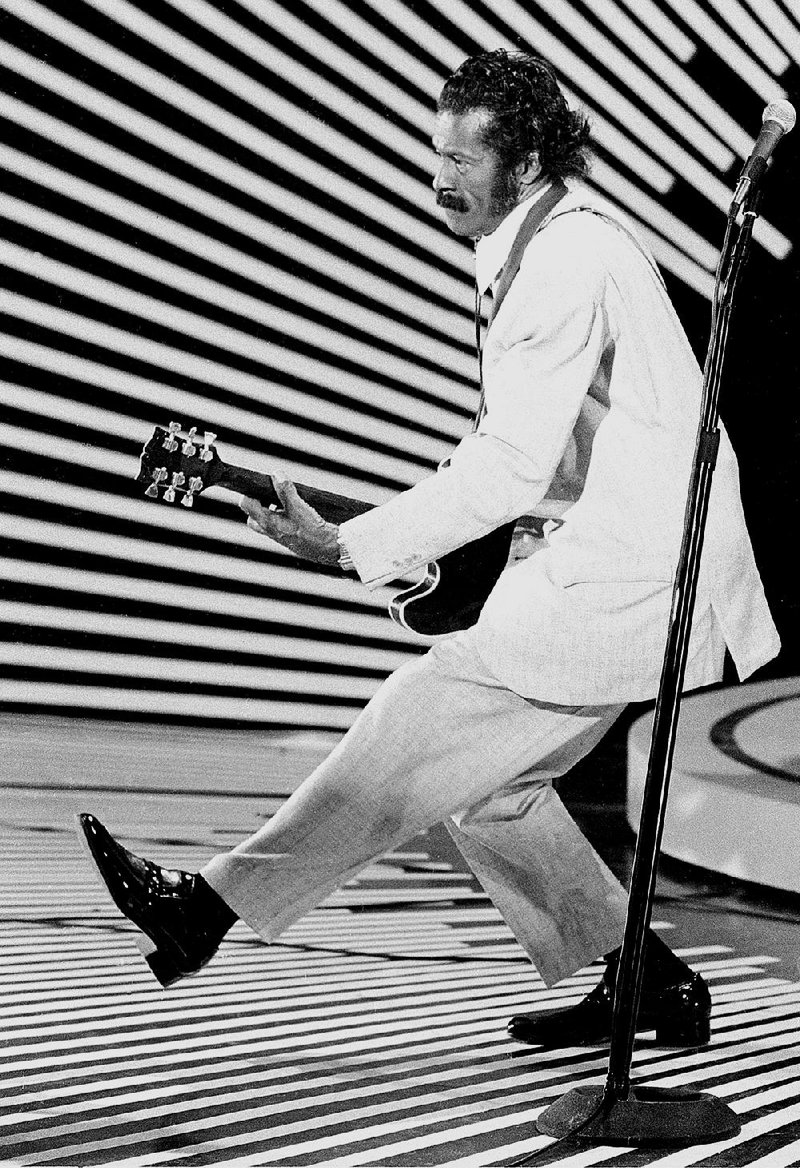NEW YORK -- Chuck Berry, rock 'n' roll's founding guitar hero and storyteller who defined the music's joy and rebellion in such classics as "Johnny B. Goode," "Sweet Little Sixteen" and "Roll Over Beethoven," died Saturday at his home in an unincorporated area west of St. Louis. He was 90.
Emergency responders summoned to Berry's residence by his caretaker about 12:40 p.m. found him unresponsive, police in Missouri's St. Charles County said in a statement. Attempts to revive Berry failed, and he was pronounced dead shortly before 1:30 p.m., police said.
Berry's core repertoire was about three dozen songs, his influence incalculable, from the Beatles and the Rolling Stones to virtually any group from garage band to arena act that called itself rock 'n' roll.
While Elvis Presley gave rock its libidinous, hip-shaking image, Berry was the auteur, setting the template for a new sound and way of life. Well before the rise of Bob Dylan, Berry wedded social commentary to the beat and rush of popular music.
"He was singing good lyrics, and intelligent lyrics, in the '50s when people were singing, "Oh, baby, I love you so,'" John Lennon once observed.
Former President Bill Clinton said Saturday in a statement: "He made our feet move and our hearts more joyful. And along the way he changed our country and the history of popular music. Chuck played at both my inaugurations and at the White House for my 25th Georgetown reunion, and he never slowed down, which is why his legend grew every time he stepped on stage."
Berry, in his late 20s before his first major hit, crafted lyrics that spoke to the teenagers of the day and remained fresh decades later. "Sweet Little Sixteen" captured rock 'n' roll fandom, an early and innocent ode to the girls later known as "groupies." "School Day" told of the sing-song trials of the classroom ("American history and practical math; you're studying hard, hoping to pass...") and the liberation of rock 'n' roll once the day's final bell rang.
"Roll Over Beethoven" was an anthem to rock's history-making power, while "Rock and Roll Music" was a guidebook for all bands that followed. "Back in the U.S.A." was a black man's straight-faced tribute to his country at a time there was no guarantee Berry would be served at the drive-ins and corner cafes he was celebrating.
"Johnny B. Goode," the tale of a guitar-playing country boy whose mother tells him that he'll be a star, was Berry's signature song, the archetypal narrative for would-be rockers. Berry can hardly contain himself as the words hurry out and the downpour of guitar, drums and keyboards amplifies every call of "Go, Johnny Go!"
When NASA launched the unmanned Voyager I in 1977, an album was stored on the craft that would explain music on Earth to extraterrestrials. The one rock song included was "Johnny B. Goode."
Charles Edward Anderson Berry was born in St. Louis on Oct. 18, 1926.
He began his musical career at age 15 when he went on stage at a high school review to do his own version of Jay McShann's "Confessin' the Blues."
He began to have run-ins with the law in 1944, when a joy-riding trip to Kansas City included armed robberies and car theft. Berry served three years of a 10-year sentence at a reformatory.
A year after his October 1947 release, Berry met and married Themetta Suggs. Berry then started sitting in with local bands. By 1950, he had graduated to a six-string electric guitar and was making his own crude recordings on a reel-to-reel machine.
On New Year's Eve 1952 at The Cosmopolitan club in East St. Louis, Ill., Johnnie Johnson, the boogie-woogie piano master who collaborated on many Berry hits, called Berry to fill in for an ailing saxophonist in his Sir John Trio.
"He gave me a break" and his first commercial gig, for $4, Berry later recalled.
In 1955, Berry signed with Chicago's Chess Records.
But his career nearly ended in the 1960s, when he was indicted for violating the Mann Act, which barred transportation of a minor across state lines for "immoral purposes." An all-white jury found him guilty in 1960, but the charges were vacated after the judge made racist comments. A trial in 1961 led to his serving 1½ years of a three-year term. Berry continued to record after getting out, but his hit-making days were essentially over.
Tax charges came in 1979, and another three-year prison sentence, all but 120 days of which was suspended.
"Every 15 years, in fact, it seems I make a big mistake," Berry acknowledged in his memoir.
Still, echoing the lyrics of "Back in the U.S.A.," he said: "There's no other place I would rather live, including Africa, than America. I believe in the system."
A Section on 03/19/2017
